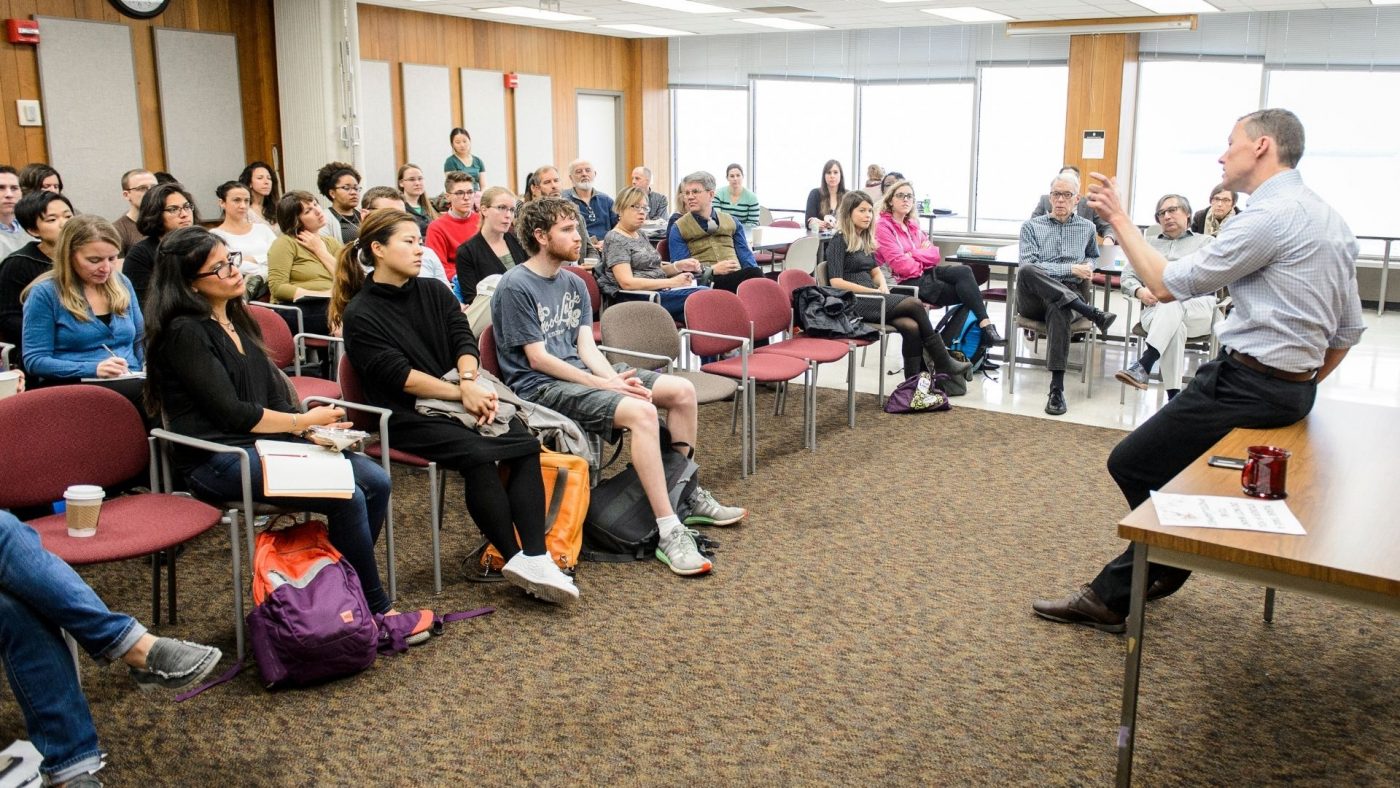Sociology students seek to understand how society works, and are equipped to enter a wide range of professional fields.
July 2019

Students and faculty of the University of Wisconsin-Madison’s sociology department attend a talk by sociologist Matthew Desmond (right), author of the Pulitzer-winning book, Evicted: Poverty and Profit in the American City. Photograph by Bryce Richter/UW-Madison
For Indian students considering studying abroad, a degree in sociology can help them gain a broader understanding of how society works. It can also open up a breadth of career opportunities.
Sociologists study a broad range of topics, including family, friendship groups, intimate relationships, education, culture, politics, economics, crime, inequalities, health issues and environment. They learn to deal with challenging problems creatively, conduct research, develop analytical and critical thinking skills and communicate ideas effectively.
Wake Forest University, a private university in Winston-Salem, North Carolina, has about 120 undergraduate students majoring in sociology. Most choose from one of the department’s three concentrations: business and society, which could lead to finance, marketing and other corporate careers; crime and criminal justice, for careers in criminal justice or to go on to law school; and the social determinants of health and well-being, which prepares students for careers in public health or for medical school. About half the students who complete the program go on to graduate school.
About 15 percent of the sociology majors are international students. They are “well served by the business and society concentration,” says Joseph Soares, department chair, “because it looks at global market forces and how markets are structured by social forces. We give students up-to-date market information, and get them to analyze it and understand what’s going on.”
“Our business and society students do very well in the job market; they get high-paying jobs,” he adds.
The well-resourced campus has small classes for better faculty-student engagement. The sociology class size, for instance, is capped at 35 students. The tuition fee is about $55,000 (Rs. 38 lakh approximately) per year, plus additional charges for housing, meals and so on. More than 56 percent of its undergraduate students receive need-based and merit-based financial assistance. The university offers a range of grants, scholarships, work-study and subsidized loans to meet the financial needs of the students.
Another option for students interested in sociology is University of Wisconsin-Madison, which has a long history as a leading research institution. Its sociology department has about 250 undergraduate majors, about 10 percent of whom are international students, as well as 120 graduate students, and nearly 25 percent of them are international. Graduate studies in sociology at the university is a Ph.D. program. It does not have a master’s degree program in this subject.
Many international graduate students return to their home countries after their studies to join university faculties. Department Chair James M. Raymo says that for students with a serious academic interest in the field, it is very useful to study in a country with a strong tradition in sociology.
“It is important to study in a place with a long history of rigorous research in the discipline. This lets students return to their countries with an ability to really understand the subject and participate in the international arena.”
For undergraduate students, American or international, who are not residents of Wisconsin, tuition is about $37,000 (Rs. 25 lakh approximately) annually. Admissions for graduate studies are quite competitive, and only about 15 percent of applicants are accepted. There are no particular academic requirements, though research experience, for example at a think tank, increases the chances of acceptance.
Once accepted into a graduate program in sociology, or other social sciences at the University of Wisconsin-Madison, students should have no financial worries. “Unlike law, business or medical school, we guarantee our students—assuming good performance—five years of support,” says Raymo. This includes all tuition payments, social benefits like health insurance and a living stipend. In exchange, graduate students work as teaching or research assistants, typically for 20 hours per week.
Graduate students in sociology choose from about a dozen specializations, including political sociology, economic sociology, demography and ecology, and medical sociology. Students must write a book-length research thesis to earn their Ph.D. degrees.
Many of those who earn a Ph.D. degree in sociology take up jobs as researchers or policy analysts with government, international organizations or think tanks. Increasingly, says Raymo, “graduates are going into private sector jobs with companies like Google and Facebook, as senior scientists evaluating the massive amounts of data being collected and what it means.”
Burton Bollag is a freelance journalist living in Washington, D.C.
COMMENTS